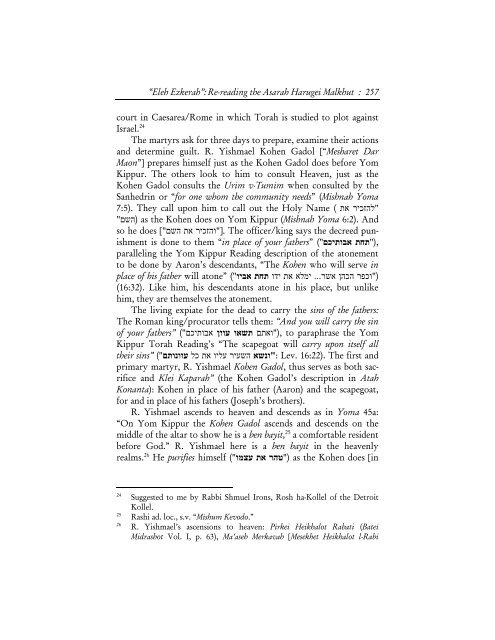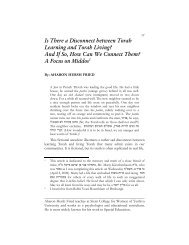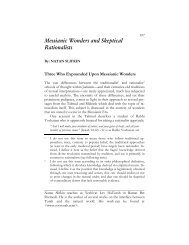“Eleh Ezkerah”: Re-reading the Asarah Harugei Malkhut - Hakirah
“Eleh Ezkerah”: Re-reading the Asarah Harugei Malkhut - Hakirah
“Eleh Ezkerah”: Re-reading the Asarah Harugei Malkhut - Hakirah
Create successful ePaper yourself
Turn your PDF publications into a flip-book with our unique Google optimized e-Paper software.
<strong>“Eleh</strong> <strong>Ezkerah”</strong>: <strong>Re</strong>-<strong>reading</strong> <strong>the</strong> <strong>Asarah</strong> <strong>Harugei</strong> <strong>Malkhut</strong> : 257<br />
court in Caesarea/Rome in which Torah is studied to plot against<br />
Israel. 24<br />
The martyrs ask for three days to prepare, examine <strong>the</strong>ir actions<br />
and determine guilt. R. Yishmael Kohen Gadol [“Mesharet Dar<br />
Maon”] prepares himself just as <strong>the</strong> Kohen Gadol does before Yom<br />
Kippur. The o<strong>the</strong>rs look to him to consult Heaven, just as <strong>the</strong><br />
Kohen Gadol consults <strong>the</strong> Urim v-Tumim when consulted by <strong>the</strong><br />
Sanhedrin or “for one whom <strong>the</strong> community needs” (Mishnah Yoma<br />
7:5). They call upon him to call out <strong>the</strong> Holy Name ( תא ריכזהל"<br />
" םשה)<br />
as <strong>the</strong> Kohen does on Yom Kippur (Mishnah Yoma 6:2). And<br />
so he does [ " םשה תא ריכזהו"<br />
]. The officer/king says <strong>the</strong> decreed punishment<br />
is done to <strong>the</strong>m “in place of your fa<strong>the</strong>rs” ( " םכיתובא תחת"<br />
),<br />
paralleling <strong>the</strong> Yom Kippur <strong>Re</strong>ading description of <strong>the</strong> atonement<br />
to be done by Aaron’s descendants, “The Kohen who will serve in<br />
place of his fa<strong>the</strong>r will atone” ( " ויבא תחת ודי תא אלמי ... רשא ןהכה רפכו"<br />
)<br />
(16:32). Like him, his descendants atone in his place, but unlike<br />
him, <strong>the</strong>y are <strong>the</strong>mselves <strong>the</strong> atonement.<br />
The living expiate for <strong>the</strong> dead to carry <strong>the</strong> sins of <strong>the</strong> fa<strong>the</strong>rs:<br />
The Roman king/procurator tells <strong>the</strong>m: “And you will carry <strong>the</strong> sin<br />
of your fa<strong>the</strong>rs” ( " םכיתובא ןווע ואשת םתאו"<br />
), to paraphrase <strong>the</strong> Yom<br />
Kippur Torah <strong>Re</strong>ading’s “The scapegoat will carry upon itself all<br />
<strong>the</strong>ir sins” ( " םתונווע לכ תא וילע ריעשה אשנו"<br />
: Lev. 16:22). The first and<br />
primary martyr, R. Yishmael Kohen Gadol, thus serves as both sacrifice<br />
and Klei Kaparah” (<strong>the</strong> Kohen Gadol’s description in Atah<br />
Konanta): Kohen in place of his fa<strong>the</strong>r (Aaron) and <strong>the</strong> scapegoat,<br />
for and in place of his fa<strong>the</strong>rs (Joseph’s bro<strong>the</strong>rs).<br />
R. Yishmael ascends to heaven and descends as in Yoma 45a:<br />
“On Yom Kippur <strong>the</strong> Kohen Gadol ascends and descends on <strong>the</strong><br />
middle of <strong>the</strong> altar to show he is a ben bayit, 25 a comfortable resident<br />
before God.” R. Yishmael here is a ben bayit in <strong>the</strong> heavenly<br />
realms. 26 He purifies himself ( " ומצע תא רהט"<br />
) as <strong>the</strong> Kohen does [in<br />
24<br />
Suggested to me by Rabbi Shmuel Irons, Rosh ha-Kollel of <strong>the</strong> Detroit<br />
Kollel.<br />
25<br />
Rashi ad. loc., s.v. “Mishum Kevodo.”<br />
26<br />
R. Yishmael’s ascensions to heaven: Pirkei Heikhalot Rabati (Batei<br />
Midrashot Vol. I, p. 63), Ma‘aseh Merkavah [Mesekhet Heikhalot l-Rabi

















